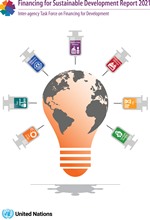Published on Tue, 2021-06-01 11:53
The Covid-19 pandemic is affecting the whole world, but in differentiated ways, highlighting structural inequalities within and between countries. The confluence of a health emergency and economic crisis has shown the disastrous consequences of undermining democratic governance and weakening public services. The crisis has elicited much talk of solidarity. But the brutal competition for vaccines shows that solidarity is used merely as a rhetorical phrase. The interests of a privileged elite continue to dominate. The prospects for recovery are diverging dangerously within and across countries and regions. The slogan “Leave no one behind” of the 2030 Agenda remains a mere mockery. |
Published on Tue, 2021-05-11 14:14
Arab NGO Network for Development (ANND) strongly condemns the attacks on defenseless Palestinians in Jerusalem and its neighborhoods, especially the attempt to uproot the residents of Sheikh Jarrah, calls on the international community to launch the broadest solidarity campaign with the Palestinian people and provide international protection for defenseless citizens in implementation of international laws, especially the Geneva Convention. |
Published on Thu, 2021-05-06 17:47
In 2007, the UN General Assembly (UNGA) established an Ad Hoc Working Group on the revitalization of the work of the General Assembly (AHWG) which in recent years has addressed the selection process of the UN Secretary-General (S-G). The current S-G Antonio Guterres’ five-year term is set to expire on 31 December 2021 and Member States have begun activities for the 2021 selection and appointment for the UN S-G position, including a thematic debate on the selection process on 23 April. |
Published on Tue, 2021-05-04 14:17
The International Finance Corporation, the branch of the World Bank that lends to the private sector, is closely associated with the biggest corruption cases in history, including the infamous Odebrecht scandal that resulted in the removal, imprisonment and even suicide of several Latin American presidents. Yet diplomatic immunity has kept the Bank and its Private–Public Partnerships model away from scrutiny. |
Published on Tue, 2021-04-06 14:14
In the lead-up to the UN’s Financing for Development Forum that takes place virtually from April 12-15, the 2021 edition of the Financing for Sustainable Development Report has been released. The report is published by the so-called Inter-Agency Task Force (IATF), which comprises numerous UN entities, but also the International Monetary Fund, the World Bank and the World Trade Organization. It is widely considered the most comprehensive source of data and analysis on development finance topics. |
SUSCRIBE TO OUR NEWSLETTER







